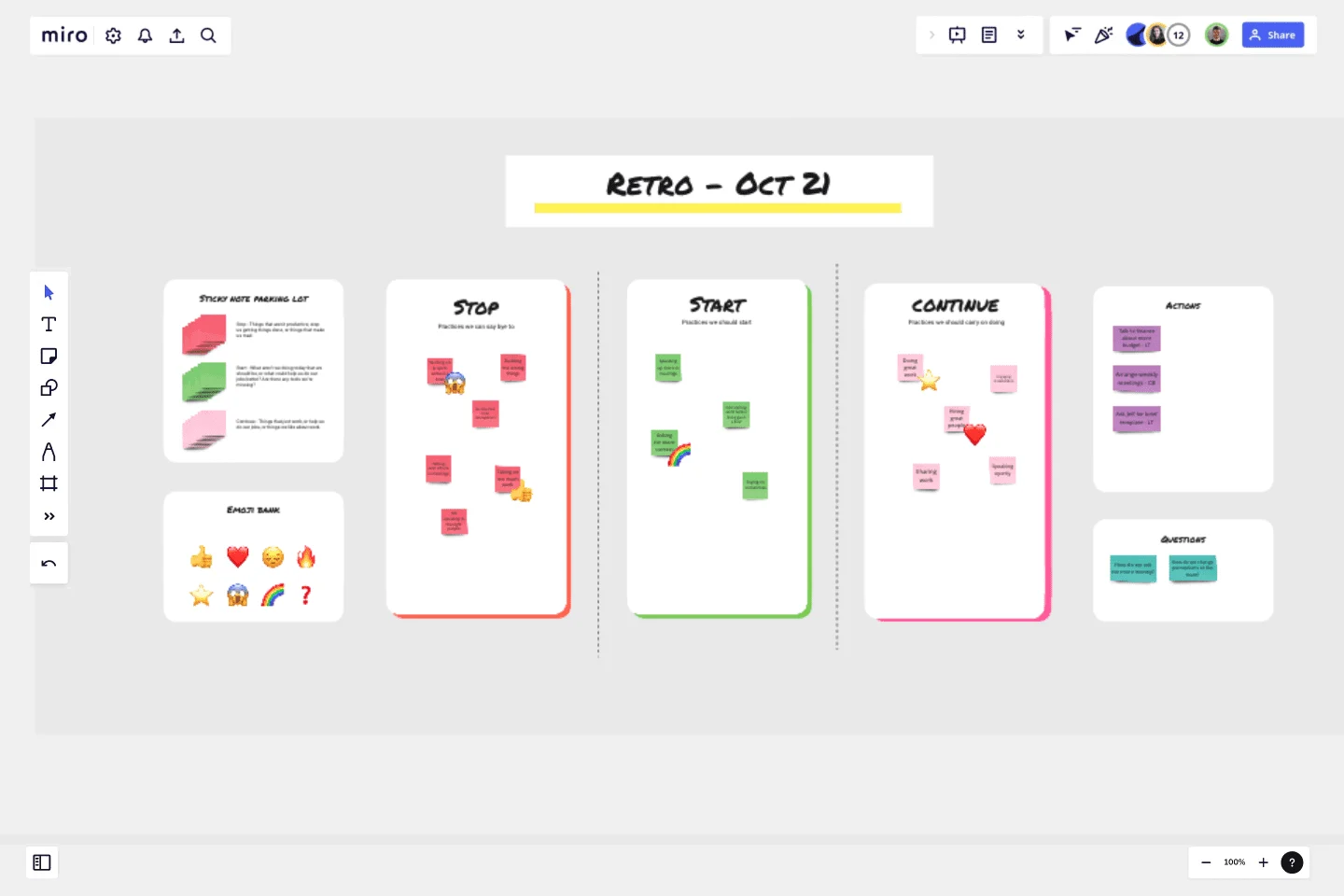Start, Stop, Continue Retrospective by Laura Timmins
A perfect remote retrospective template to get teams thinking about what in their current workflow works well, what needs work, and what do they need to start doing.
This doesn't need to be used at the end of a sprint or project - it can be used when forming teams to determine the best way to proceed successfully. If you haven't run a retro before, there are instructions and recommended timings for each part of the activity, and an idea of what you should be ending up with once the retro is over.
Participants: 2 - 10+ (one facilitator needed).
Time to complete: 15 - 90 mins dependant on team size.
Steps:
Try and use an icebreaker before to get everyone warmed up and ready to share
Ask everyone to spend 5-15 minutes writing sticky notes with items for each of the Stop, Start, Continue areas.
Once this has been done, spend a few minutes grouping these into themes for discussion.
If there is a lot of themes, tell the participants they have between 3 and 5 votes each. They then can vote to decide which topics should be discussed further.
Spend a few minutes discussing each topic, and try to write down actions for each to take away and address.
Tips:
Try to encourage the team to be open and honest.
Ask members to use emojis to react or emphasise different topics raised.
Ensure actions are assigned to individuals to take away to address changes needed.
This template was created by Laura Timmins.
Get started with this template right now.
Lean Coffee: Meetings without Agendas
Works best for:
Agile
Lean Coffee: Meetings without Agendas is a collaborative meeting format that fosters open dialogue and emergent topics. Participants suggest discussion topics, vote on them, and engage in time-boxed conversations. This template provides a structured framework for facilitating Lean Coffee sessions, enabling teams to prioritize topics, share insights, and make decisions collectively. By promoting inclusivity and adaptability, Lean Coffee empowers teams to address issues efficiently and drive continuous improvement.
Project Charter Template
Works best for:
Project Management, Documentation, Strategic Planning
Project managers rely on project charters as a source of truth for the details of a project. Project charters explain the core objectives, scope, team members and more involved in a project. For an organized project management, charters can be useful to align everyone around a shared understanding of the objectives, strategies and deliverables for a project of any scope. This template ensures that you document all aspects of a project so all stakeholders are informed and on the same page. Always know where your project is going, its purpose, and its scope.
Soccer Retrospective
Works best for:
Agile Methodology, Retrospectives, Meetings
The Soccer Retrospective template offers a sports-themed approach to retrospectives, using the game of soccer as a metaphor for teamwork and strategy. It provides elements for reflecting on past performances, analyzing strengths and weaknesses, and setting goals for improvement. This template fosters a competitive yet collaborative spirit, encouraging team members to work together towards common objectives. By leveraging the metaphor of soccer, the Soccer Retrospective empowers teams to refine their tactics, enhance communication, and achieve their goals effectively.
Reflection Island: End of Year Team Retro
Works best for:
Retrospectives, Agile Methodology, Meetings
The Reflection Island: End of Year Team Retro template offers a creative and themed approach to retrospectives, perfect for wrapping up the year. It provides elements for reflecting on achievements, challenges, and goals using a tropical island theme. This template enables teams to celebrate successes, learn from setbacks, and set intentions for the upcoming year in a relaxed and enjoyable atmosphere. By promoting reflection and celebration, the Reflection Island: End of Year Team Retro empowers teams to strengthen bonds, boost morale, and start the new year with renewed energy and focus effectively.
Product x Marketing Roadmap
Works best for:
Product Management, Roadmap
Align product development with marketing strategies using the Product x Marketing Roadmap. This template helps you coordinate product launches, marketing campaigns, and key milestones. Use it to ensure both teams are on the same page, maximizing the impact of your product releases. Ideal for product managers and marketing teams aiming to synchronize their efforts and achieve cohesive, successful product launches and campaigns.
Lesson Reflection Template
Works best for:
Education, Meetings
The Lesson Reflection template is a tool to create space for self-reflection and improvement. Students can evaluate the key takeaways from a lesson and what are the topics they find most interesting. As teachers receive the student’s Lesson Reflection, they can look for opportunities to improve learning and teaching methodologies. The Lesson Reflection template can help you facilitate the educational process, and it’s easy to use and straightforward.
